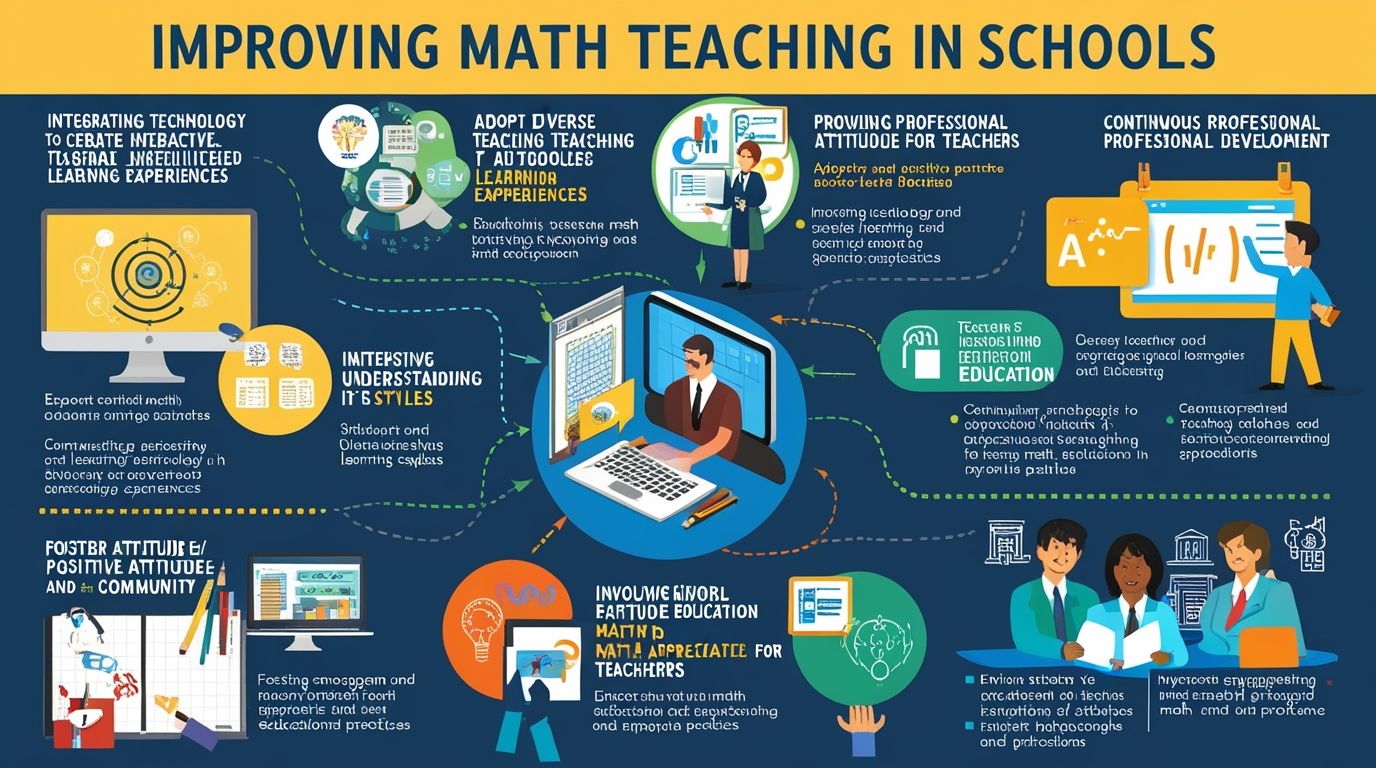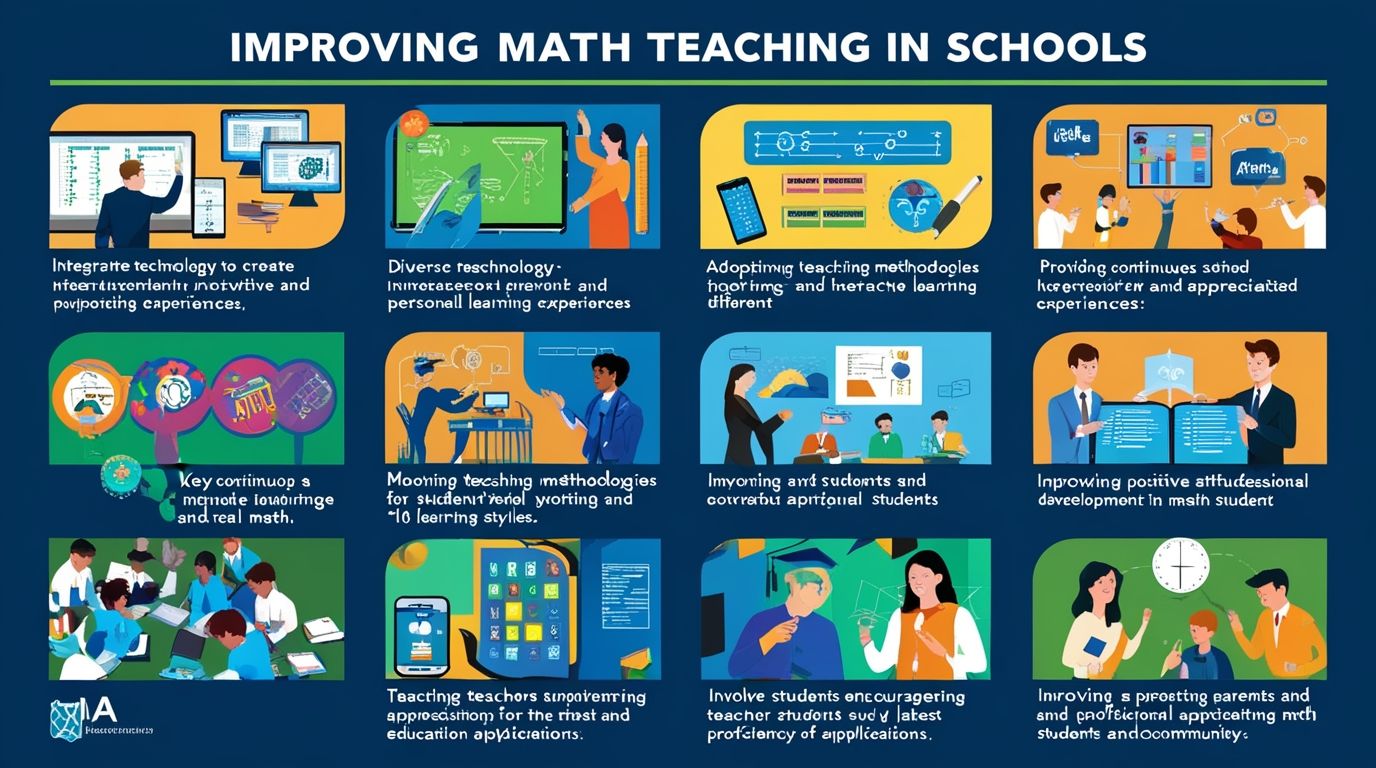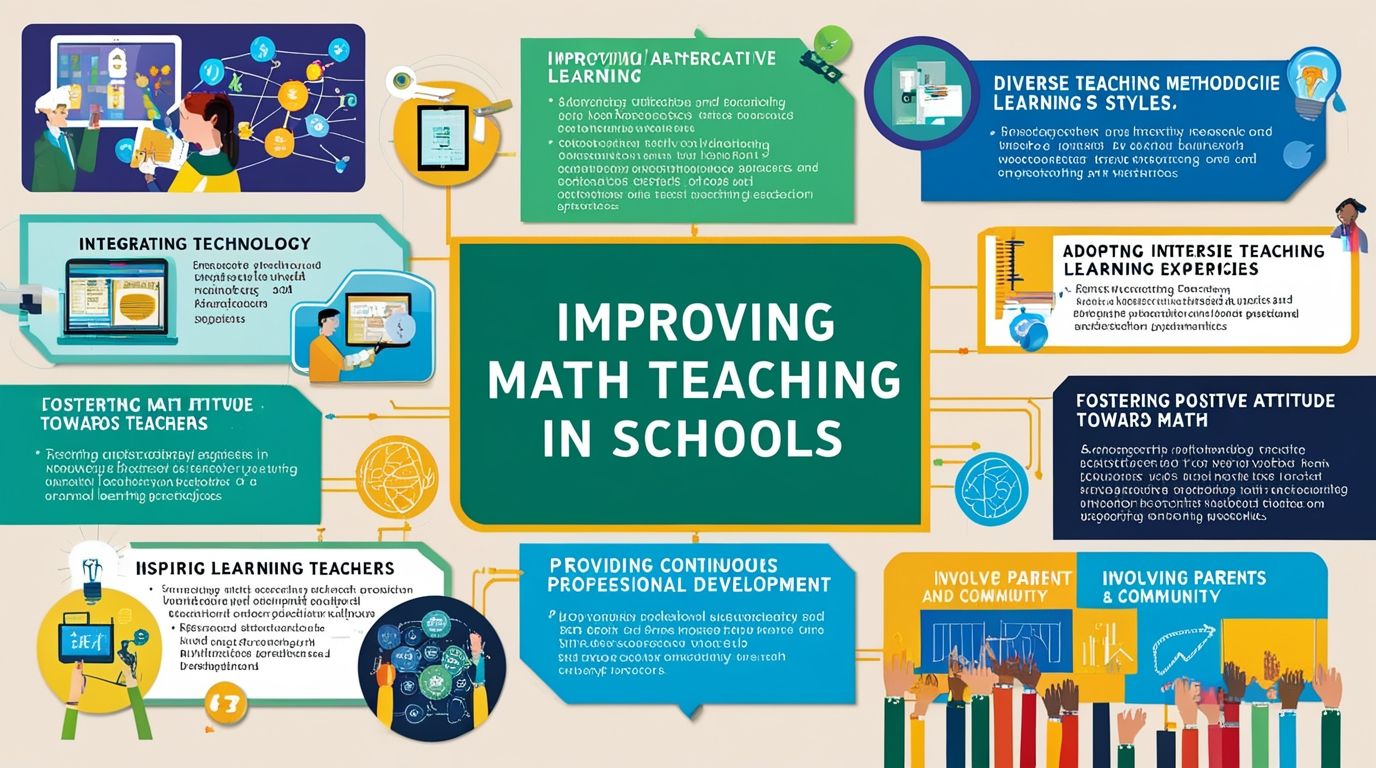Improving Math Teaching in Schools Mathematics is a fundamental discipline that forms the backbone of various fields such as science, technology, engineering, and economics. Despite its importance, many students struggle with math, leading to a lack of interest and proficiency. To address this issue, it is crucial to improve the teaching methods and learning environment for mathematics in schools. This essay discusses several strategies to enhance math teaching, including integrating technology, adopting diverse teaching methodologies, providing continuous professional development for teachers, fostering a positive attitude towards math, and encouraging parental and community involvement.
Integrating Technology
Incorporating technology into math education can make learning more engaging and effective. Interactive tools such as educational software, apps, and online platforms can provide students with hands-on experiences that traditional methods may lack. For instance, tools like Khan Academy offer personalized learning experiences, allowing students to progress at their own pace. Virtual manipulatives can help students visualize and understand abstract concepts, making math more concrete and accessible.
Moreover, technology enables the use of adaptive learning systems that tailor instruction to meet individual students’ needs. These systems can identify areas where students struggle and provide additional resources and practice problems. By integrating technology into the classroom, teachers can create a dynamic and interactive learning environment that caters to diverse learning styles.
Adopting Diverse Teaching Methodologies
Traditional lecture-based teaching methods may not be effective for all students. To improve math teaching, educators should adopt a variety of instructional approaches that cater to different learning preferences. Here are some methods to consider:
- Inquiry-Based Learning: Encouraging students to ask questions and explore mathematical concepts through investigation can foster a deeper understanding. This approach promotes critical thinking and problem-solving skills.
- Collaborative Learning: Group work and peer-to-peer learning can help students learn from each other and develop communication skills. Collaborative activities such as group projects and discussions can make math more interactive and enjoyable.
- Real-World Applications: Demonstrating the relevance of math to real-life situations can increase student engagement. Teachers can incorporate practical examples and hands-on activities that show how math is used in everyday life and various professions.
- Differentiated Instruction: Tailoring lessons to meet the diverse needs of students can enhance learning outcomes. Teachers can use formative assessments to identify students’ strengths and weaknesses and provide targeted support and enrichment activities.
Continuous Professional Development for Teachers
Effective math teaching requires teachers to be well-versed in both mathematical content and pedagogy. Continuous professional development (CPD) is essential for teachers to stay updated with the latest teaching strategies and educational research. CPD opportunities can include workshops, conferences, online courses, and peer collaboration.
By participating in professional development, teachers can learn new instructional techniques, improve their understanding of mathematical concepts, and gain insights into student learning processes. Additionally, creating a supportive community of practice where teachers can share experiences and resources can enhance professional growth and improve teaching quality.

Fostering a Positive Attitude Towards Math
Students’ attitudes towards math can significantly impact their learning outcomes. A positive attitude towards math can increase motivation, confidence, and persistence. To foster a positive attitude, educators can:
- Encourage a Growth Mindset: Emphasize that math abilities can be developed through effort and practice. Highlight the importance of perseverance and learning from mistakes.
- Celebrate Achievements: Recognize and celebrate students’ progress and successes, no matter how small. Positive reinforcement can boost students’ confidence and encourage continued effort.
- Create a Supportive Environment: Establish a classroom culture where students feel safe to take risks and make mistakes. Provide constructive feedback and support to help students overcome challenges.
- Promote Enjoyment of Math: Incorporate fun and engaging activities such as math games, puzzles, and competitions. Making math enjoyable can help reduce anxiety and increase interest.

Encouraging Parental and Community Involvement
Parental and community involvement can play a crucial role in enhancing math education. When parents and community members actively participate in the learning process, students receive additional support and motivation. Here are some ways to encourage involvement:
- Parental Engagement: Educate parents about the importance of math and how they can support their children’s learning at home. Provide resources and activities that parents can use to reinforce math skills.
- Community Partnerships: Collaborate with local businesses, organizations, and universities to create opportunities for students to see the practical applications of math. Guest speakers, field trips, and internships can provide valuable experiences and inspire students.
- Math Clubs and Events: Organize extracurricular activities such as math clubs, competitions, and family math nights. These events can create a sense of community and excitement around math.
- Volunteer Programs: Encourage community members to volunteer in the classroom or as mentors. Volunteers can provide additional support and serve as positive role models.
Conclusion
Improving math teaching in schools requires a multifaceted approach that addresses the diverse needs of students and teachers. By integrating technology, adopting diverse teaching methodologies, providing continuous professional development for teachers, fostering a positive attitude towards math, and encouraging parental and community involvement, we can create a more effective and engaging math education experience. These strategies can help students develop a strong foundation in math, enhance their problem-solving skills, and prepare them for future academic and career success.

euvdl6
zucbay
Great post. I am facing a couple of these problems.
cefwun
This all-in-one clock radio CD player is more than just an alarm—it’s a full media hub. Along with a traditional CD player, it features AM/FM radio, Bluetooth connectivity, and a wireless remote control. Dual alarms make it easy to set different wake times, while the large LED display ensures easy readability. With rich stereo sound and multiple playback options, it’s one of the best clock radios with CD player and Bluetooth functionality. Great for music lovers who value versatility in a radio alarm clock CD player setup.
Great ?V I should certainly pronounce, impressed with your website. I had no trouble navigating through all tabs as well as related info ended up being truly easy to do to access. I recently found what I hoped for before you know it in the least. Reasonably unusual. Is likely to appreciate it for those who add forums or something, web site theme . a tones way for your client to communicate. Nice task..
Hey there! I know this is kinda off topic but I was wondering if you knew where I could locate a captcha plugin for my comment form? I’m using the same blog platform as yours and I’m having trouble finding one? Thanks a lot!
You need to participate in a contest for the most effective blogs on the web. I will suggest this web site!
I like this blog very much, Its a really nice post to read and incur info .
Really clear internet site, regards for this post.
I would like to thnkx for the efforts you have put in writing this blog. I am hoping the same high-grade blog post from you in the upcoming as well. In fact your creative writing abilities has inspired me to get my own blog now. Really the blogging is spreading its wings quickly. Your write up is a good example of it.
I have been exploring for a bit for any high quality articles or blog posts in this kind of space . Exploring in Yahoo I eventually stumbled upon this site. Studying this information So i am happy to convey that I have a very excellent uncanny feeling I found out just what I needed. I such a lot definitely will make certain to don?¦t omit this web site and provides it a glance on a continuing basis.
F*ckin’ awesome things here. I am very happy to peer your article. Thank you so much and i am looking forward to contact you. Will you please drop me a mail?
I like the efforts you have put in this, regards for all the great articles.
You made some clear points there. I looked on the internet for the subject and found most persons will approve with your site.
Everyone loves what you guys tend to be up too. This sort of clever work and coverage! Keep up the amazing works guys I’ve included you guys to our blogroll.
Can I just say what a aid to find somebody who actually is aware of what theyre speaking about on the internet. You definitely know learn how to deliver a difficulty to gentle and make it important. Extra individuals must learn this and perceive this side of the story. I cant believe youre not more well-liked since you undoubtedly have the gift.